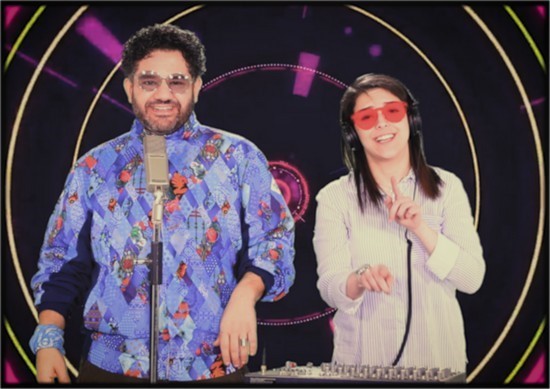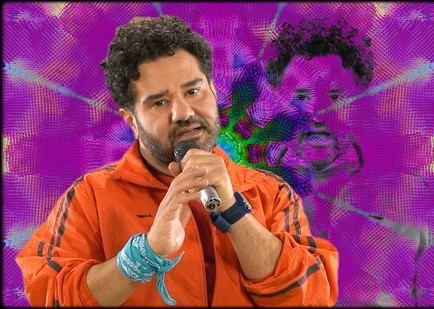Fawazeer Cassette, a Jordanian show presented by
Mohammed Qaq, pays
tribute to the traditional Egyptian Ramadan TV broadcast Fawazeer by reviving
music sketches and riddles that allow audiences to engage and win.
اضافة اعلان
Despite the
historical tribute, Qaq takes a modern approach to his around two-minute
episodes by posting his bits only on Facebook and Instagram. And in every
Fawazeer Cassette episode Qaq invites a guest and plays a song or a mash-up of
a popular 70s or 80s hit, portraying a light, youthful, and rhythmic edge with
dance and comedy spiked frequently into the pieces.
Golden era and
cassettes
Qaq, who is a visual artist and multimedia storytelling trainer, told
Jordan
News: “I picked this title because it’s what people used to get their music
on — cassettes — during the 70s and until the 90s and early 2000. It’s a
reminder of those good old days of Fawazeer.”
“These days were
the golden era, of creativity, music, joyful spirits, and dancing shows. That’s
what we lack nowadays.”
To revive the
golden era, Qaq plays covers of the most iconic songs of that time and poses a
question related to it.
 In every Fawazeer Cassette episode Mohammed Qaq invites a guest and plays a song or a mash-up of a popular 70s or 80s hit. (Photos: Handout from Fawazeer Cassette)
In every Fawazeer Cassette episode Mohammed Qaq invites a guest and plays a song or a mash-up of a popular 70s or 80s hit. (Photos: Handout from Fawazeer Cassette)
According to Qaq,
Fawazeer Cassette celebrates an era where
Arabic songs were liberated from the
shackles of traditional sorrow and heartbreak and instead moved to more free
melodies and rhythm. The lighter representation of the 70s, 80s, and 90s in
music also encouraged body movement and storytelling through music as a means
to document the time period, which Qaq aims to revive.
Beyond Qaq being a
fan of the era, he believes that Fawazeer Cassette honors a group of singers
and musicians who changed the artistic scene back then and hopes that it
introduces millennials and generation Z to those icons.
Classical Arabic TV and music influence
As expected, Qaq derives his inspiration from 70s, 80s, and 90s TV and
music, especially classical Arab music. However, the element of surprise is
also present as Qaq stated that he follows his gut instinct, especially during
studio recording for broadcasting.

“During the visual
storyboard, the team and I make many changes again and again on the spot.
Inspiration kicks off and the music starts playing and we record it differently
based on the inspiration,” said Qaq.
“It is not easy to
have an independent production with a few individuals. A big effort is made to
produce every single episode,” he added, highlighting the effort it takes to
create and shoot each episode to best reach the greatest amount of audiences.
This is not the
first time Qaq present such a show. During the COVID-19 quarantine in 2020, he
had a show called Mahjour Afandi, and it followed a similar beat to this one
Social media outreach
On average, internet users worldwide are said to consume around 147
minutes per day, according to Statista Research Department.

Qaq contended that
social media is currently “the big game” and a “powerful tool” which is why he
posts every episode on Fawazeer Cassette online.
Traditional history
of Fawazeer
The tradition of Fawazeer dates back to the 1950s and has remained up to
now, but the peak of Fawazeer was when by Nelly and Sherihan presented Fawazeer
in the 1980s and 1990s, forming part of the childhood nostalgia that Qaq wishes
to recreate.
Although many
actors had participated in Ramadan entertainment prior — including Yehia
El-Fakharany, Sabreen, Sherine Reda, and famous belly dancers Dina and Lucy —
Nelly, Sherihan, and Ghaneim are considered the standouts of Ramadan TV
riddles.
Lebanese singer
Miryam Fares also presented Fawazeer Ramadan, but the Egyptian riddles always
won over the audiences more.
Previously, the
traditional
Ramadan riddles were a short 10-minute broadcast containing dance
numbers and sketches that present an affectionate pastiche of Egyptian pop
culture of the pre-satellite TV era.

Each episode
revolved around a riddle anchored to a specific theme followed through for an
entire 30-episode season that audiences were asked to solve.
Despite the costs
for producing those shows being extremely costly, since it demanded
multi-talented stars who could act, sing and dance, Fawazeer Ramadan, was one
of the most precious memories of 80s-90s children inspiring them to continue
production.
Fawazeer Ramadan
represents nostalgic moments of happiness people get after breaking their fast,
bringing them back to when life was much lighter and TV production was
exclusive and far from the digital revolution which later changed.
Read more Lifestyle
Jordan News



